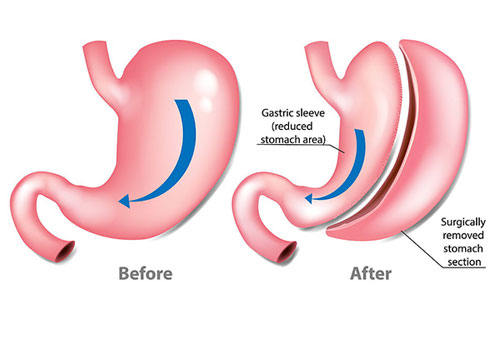Best Gastric sleeve surgeon in delhi
Sleeve Gastrectomy
Sleeve gastrectomy is a surgical procedure that induces weight loss by restricting food intake. With this procedure, which is usually performed laparoscopically, the surgeon removes approximately 75 percent of the stomach. This results in the stomach taking on the shape of a tube or “sleeve” which holds much less food. Dr. Sukhvinder Singh Saggu is the best weight loss surgeon. Call now for a Sleeve Gastrectomy in Delhi NCR.

Advantages of the Sleeve Gastrectomy
- Reduced size of stomach, increases feeling of fullness
- Does not require disconnecting or reconnecting of the intestines
- Stomach functions normally, allowing most foods to be eaten in smaller amounts
- Less invasive than gastric bypass
- Removes gland that secretes ghrelin, the hunger hormone
- No foreign bodies (bands, tubes, etc.) permanently inside body
- No risk of “dumping syndrome” typically associated with gastric bypass
Risks and potential side effects
- Bleeding
- Infection
- Hernias
- Heartburn
- Narrowing of the sleeve because of scarring
- Leaking from the staple line
- New or worse acid reflux
- A few patients develop dumping syndrome when food passes too quickly through the digestive system. This can lead to nausea, vomiting, and diarrhea. It often goes away within three months.
Call now for a consult on Sleeve Gastrectomy in Delhi NCR.
Hear the happy patient who lost 47 kgs in 5 months after Sleeve gastrectomy in this video
Frequently Asked Questions
- When can patients return to normal activity?
Ans. Patients can resume normal activity within 3 to 4 weeks after their surgery. Any pain related to the surgery should go away after 7-10 days or so. One must take proper precautions and follow medications, lifestyle, and dietary changes to receive full recovery.
- Why can’t you eat rice after gastric sleeve?
Ans. Consuming starchy foods like fried potatoes, rice, and pasta may cause bloating, gas, and discomfort in some individuals. Avoid large amounts of rice because it’s a refined carbohydrate with few other nutrients that is hard to digest after the surgery.
- What is the best food after sleeve surgery?
Ans. Eat a high protein option and add small amounts of soft vegetables and carbohydrates. Soft and pureed foods, such as eggs, ground meats, fish, beans, cooked vegetables, and soft fruits, are good to eat. Avoid alcoholic and carbonated beverages.
- What happens 10 years after gastric sleeve?
Ans. Vitamin deficiencies, gastric stenosis, mediastinal pouch migration, and the development or exacerbation of gastroesophageal reflux diseases can occur in later life. However, the success of the surgery can be seen in patients even after 10 years of gastric sleeve.
- What is the life expectancy after gastric sleeve?
Ans. Medical research suggests that individuals who have received bariatric surgery for obesity tend to live approximately three years longer on average than those who have undergone conventional obesity treatment.
